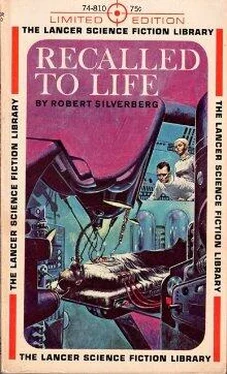“Ah. How long have you been connected with Beller, then?”
“Dr. Lurie first approached me on May 8. Roughly three weeks ago, Senator Dixon.”
“And you have acted as spokesman for the laboratory since May 8?”
“No, sir. My first public statement for Seller appeared on May 20. It was occasioned by the premature and unauthorized release of information to the public by Dr. Klaus and our then public-relations agent, Mr. Mitchison. This was the act of insubordination for which they were dismissed from the laboratory.”
“You infer that the first public announcement of the Beller reanimation experiments was made without your consent or knowledge?”
“That’s right, sir.”
“Why did you intend to maintain continued secrecy?”
“The process was not quite perfect, sir. A few more weeks of work and we could have eliminated the possibility of mental loss. It was my plan not to bring the matter to the public notice until then—but Dr. Klaus took it upon himself to inform the world without my knowledge.”
Harker glanced at Brewster and Vorys. They were frowning; perhaps he had gotten through to them. He wondered if his words would counteract the tide of unfavorable reactions already swelling.
Dixon said, “Could you tell us how close you are to actual elimination of the hazard of insanity?”
“Sorry, I can’t. That would be Dr. Raymond’s province. But I will say that research at our laboratory has virtually ceased during this period of uncertainty.”
There was a whispered conference at the dais, and abruptly Vorys replaced Dixon as interrogator.
“Mr. Harker, does the name Wayne Janson mean anything to you?”
Brewster and Vorys had evidently primed themselves well for the attack. Harker said, “Yes, Senator Vorys. Janson was an industrialist who committed suicide last week.”
“It means nothing else to you?”
“No.”
“No one of that name underwent reanimation at the Beller Laboratories? ”
“No, sir.”
Vorys paused momentarily. “The late Mr. Janson was supposed to have undergone reanimation several months before your employment at Beller. Is it possible that he did experience treatment there, and that you don’t know about it?”
“I’ve examined the list of patients at Beller since the beginning of experiments there. No one named Janson is on the list.”
“Perhaps he entered under another name.”
“We have photographs of all patients, Senator. None of them corresponded to the photo of Mr. Janson published in the newspapers.”
“In other words, you deny that he was ever a patient of the laboratories?”
“Exactly.”
“But a close friend of the late Mr. Janson claims that he did secretly enter the Beller laboratories of his own will shortly before his death of natural causes, was reanimated, and suffered such mental disturbance afterward that he took his own life.”
Harker said quietly, “It’s obvious that one party is lying, isn’t it? Our records indicate that no such person ever entered the labs for treatment. The burden of proof, I believe, rests with the other party.”
“We have only your word for this,” Vorys went on obstinately. “And you are not even under oath. Will you make these records of yours available for public inspection?”
“It would be against our policy.”
“We could subpoena the records,” Vorys warned.
Harker shrugged. “That’s within your rights, of course, I admit. But exposure of the names of our patients would probably have adverse effects on them, psychologically and otherwise.”
“That sounds very good, Mr. Harker. But it could also be an excuse for hiding something.”
Resisting the impulse to lose his temper—for Vorys was obviously deliberately baiting him—Harker said, “I believe it would be possible to grant you and your three colleagues access to our records, to prove the fraudulent nature of the Janson matter. But public exposure of the names would not be necessary, would it?”
“Quite possibly not. Thank you, Mr. Harker. We will recess for one hour now.”
As soon as Harker had left the stand, Mart Raymond approached him and said, “Things are getting rough, eh?”
Harker nodded. “Vorys and Brewster are out for our scalps. The American-Conservatives must be preparing to come down hard.”
“I’m sorry about letting that statistic slip yesterday, Jim—”
“Forget it. It had to come out sooner or later, and maybe if we had announced it at the start we wouldn’t be having so much trouble now. Well, it couldn’t be helped. Let’s go get some lunch.”
As they rode downward in the gravshaft toward the hotel dining room, Harker said, “Exactly how close are you to getting the bugs out of the process? ”
Raymond looked vague. “A week, a month, maybe a year. We know what causes the mental breakdown—most of the time. It’s a matter of hormone impurity, generally. Of course, in some cases the brain suffers severe damage in the process of dying, and we’ll never be able to lick that any more than we can revive a man who’s been blown apart by dynamite. But I’m pretty sure we can lick the defects in our own system soon.”
“And what probability of success would you predict after that?”
Raymond shrugged and said, “Who knows? Nine out of ten successes? Ninety out of a hundred? Until we have ten or twenty thousand case histories behind us, our statistics don’t mean anything.”
Harker nodded thoughtfully. The meal was a quiet one; neither man said much. Harker was going back over the morning’s session, trying to pick out the phrases the press would leap on.
He hoped he had discredited the Mitchison-Klaus combine and Bryant by his refutation. Surely the public would see that Mitchison and Klaus were vengeful power-seekers and nothing more, and that the whole Janson affair was nothing but a malicious hoax.
But he overestimated the public’s ability to distinguish truth from slung mud, it seemed. The early afternoon papers were already on sale by the time the hearing resumed for the afternoon.
The headline on the Star-Post was, KLAUS SAYS HARKER FIRED HIM; CHARGES BELLER ‘BAD FAITH’
The story, slanted heavily in Klaus’ direction, implied that the enzyme man had been on the verge of a brilliant discovery when Harker maliciously sacked him. As for the Janson case, it referred to Marker’s “uncomfortable evasions.”
The tide was turning. The public fancy had seized on the one fact, grotesque and horrifying enough, that in a few cases reanimation resulted in dreadful mindlessness. On that slim base, a massive movement aimed at the total suppression of reanimation was beginning to take form and grow in strength.
Harker had seen the phenomenon before, and had been helpless before it. The great insane raging tide of public opinion had sprung up from what had been a smoothly-flowing stream, and once its mighty power had been channelled toward a definite end, there was no standing against it.
He had the uncomfortable feeling that only a miracle could save things, now. And miracles were not easy to come by, in this secular age.
As the hearing ground along into its third day, and its fourth, and then its fifth and sixth, things grew even worse. The “zombie” phrase became a favorite, not only of the press and the public, but even of Brewster and Vorys. The fact that seven of the seventy-three reanimation subjects had been revived sans intellect had become the main issue. In his rare moments of relaxation, Harker wondered how the world would react if it were ever learned that one of those seven had been none other than the missing Senator Thurman.
Very much as Harker had expected, the American-Conservative Party intensified its previous belief in “caution” into what amounted to condemnation of the whole process. Maxwell of Vermont, the Senate Minority Leader, delivered an off-the-cuff but probably carefully-rehearsed speech at a Chicago gathering of American-Conservative committee-men, in which he referred to reanimation as “That mess engineered by a one-time lame duck of a National-Liberal, that unholy conspiracy against human dignity.”
Читать дальше












